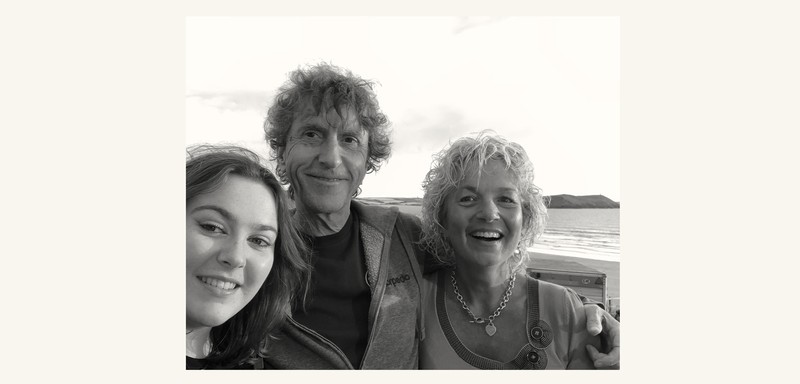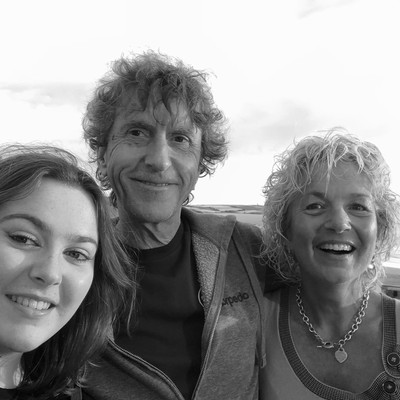

8 Life Lessons From An Inspirational Woman
Prepare For The Unexpected
Having ticked along nicely for the first 45 years of my life, getting married along the way and giving birth to our daughter Izo, I was diagnosed with metastatic breast cancer in 2013. This came out of the blue – I hadn’t felt any lumps, but I had been experiencing some backpain and fatigue. Seeing as the backpain had started after carrying a load of tents and gear at a music festival, we put it down to that. Of course, when I did eventually feel a lump, I realised what it was. I was diagnosed with HER2 breast cancer with diffuse spread to my axial skeleton. I started a course of chemotherapy which was followed by three-weekly intravenous monochlonal antibody treatments until 2017.
The cancer then spread to my right ovary and peritoneum, and I had to have three-weekly chemotherapy sessions which continued until just a few weeks ago. Unfortunately, the targeted chemo I was on has given me a rare form of liver disease, so I’ve had to come off it. There’s one bit of me that says ‘Thank God’ but there’s also that fearful side that says there’s nothing controlling the cancer now. For now, I just have to wait to see what happens with regular CT scans to see if I stay in remission.
Make The Most Of Every Day
During my very first lot of chemo, I most definitely was not on top form. But I realised that, while I was having the treatment, that period could be a significant part of my remaining life and therefore I had to live each day as if it were my last – I had to say ‘yes’ to everything (within reason) and make the most of everything, even the most mundane. Izo and my husband Rich were my biggest priority (and still are), so I had to do everything I was told to do, keep myself as well and as active as possible, turn up for the numerous appointments for blood tests, chemo etc, and keep as positive yet realistic as I could. Of course, my family had no control over any of it and the whole experience was harder for Rich and Izo and for the rest of my extended family.
Be Grateful & Focus On Turning The Negatives Into Positives
Once I’d finished my initial chemo and the disease was under control on the monochlonal antibody therapy, I was incredibly grateful to be alive. I felt so lucky the treatment was working, had stabilised the disease and I was able to continue being a mother to little Izo and a wife to Rich. I returned to work as a sister in critical care at NGH six weeks after my chemo and, by early 2014, I felt ready to take on a new challenge and help others with cancer. How do you turn something so devastating into something positive? You use it to your advantage. It’s the old SWOT [Strengths, Weaknesses, Opportunities and Threats] analysis – turn your weakness into a strength, turn the threat into an opportunity.
Find A Focus & Purpose Will Follow
In my 20s, I left my nursing career temporarily and went to read French at university – this led to me working as an events manager for a children’s charity for about four years before I went back to nursing. There, I organised fund raising events which gave me some crucial skills, many of which crossed over into my work as a nurse. I knew that organising a big party was something I could do and that I was in a unique position to be able to persuade, encourage and enthuse others to join me in putting on an event to raise funds for the chemo suite at Northampton General which had a £500k fundraising target for a new chemotherapy centre. I aired my plans with as many friends as I could and asked if they were interested in joining an organising committee – they were all keen to help in some way. I had worn different coloured wigs when my hair fell out to make the whole hair loss thing less difficult for Izo and her friends, and also as a conversation opener for those who found the cancer talk difficult. This became the theme for our event, and that is how the Big Wig Ball was born.
To date, we have run three over the last eight years – fun-filled, quirky parties that celebrate the work done to help and treat people with cancer, while at the same time raising money for various charities. We started with the ‘Big Wig Ball’, followed by ‘Big Wig Goes Bollywood’ and, last summer, we held our third event ‘Big Wig – from Burlesque to Bugsy Malone’. Each event hosted 500 guests and we have raised a grand total of £256,000. However, the fundraising is just a small part of Big Wig’s success – it has brought together in excess of 1,500 people in pursuit of a common goal and this is all due to the Big Wig committee – 13 incredible women who I’m so proud to call my friends.
/https%3A%2F%2Fsw18.sheerluxe.com%2Fsites%2Fsheerluxe%2Ffiles%2Farticles%2F2023%2F01%2F3lindsey-main1.png?itok=WsJF5MZg)
Stay Curious & Always Get A Second Opinion
As I said, I stopped my treatment a few weeks ago. The chemo I was on, called Kadcyla, was licensed in the UK in 2015 and is pretty revolutionary because it doesn’t make you feel ill. Throughout, I felt fine and carried on with my normal life, though some people can have some side effects. Of course, as an intensive care nurse, I’m not afraid to ask questions and it helps to know what questions to ask when things aren’t quite right and how to find out more. My advice is always ask for a second opinion and push for things as there is always something or someone to help. I’m a positive person, full stop – so that definitely helps. I get up and get on with things and, if I didn’t have anything to do, I don’t think that would be very good for me.
Watch Out For Those Around You
My biggest problem, or difficulty is a better term, is my daughter who is now 19. She is really good, she’s great; when I was first diagnosed, she was nine but from the age of 13 to 16 we really noticed a difference in her. Naturally, it all had an effect on her and she became very inward and, post her GCSEs, she was diagnosed as clinically depressed. A mental health nurse said she had anticipatory grief. Luckily, she is much better now. As for my husband Rich, he tends to be okay if I’m okay! He just listens to me and how I feel.
Don’t Fear Death
I am not afraid of dying. I am afraid of what it means for everyone else around me – my husband, my family and Izo in particular who has had to grow up with my illness. The only thing I’m afraid of is missing out. I think it also helps that I am an intensive care nurse and see people dying. As a culture, we are rubbish at addressing death and people don’t want to talk about it, but it’s something that happens to all of us. We celebrate marriage, having children and all those things but we don’t anticipate death. I don’t know whether people are afraid about the process – I don’t want to be in pain, of course, but I’m not afraid of actually dying.
Hold Onto Hope
I do sometimes share my illness with my patients. Many of them are often unconscious but I do share with the ones that have a common thing with me, those who fear having cancer or death. I believe it gives them a bit of hope – because if you get a diagnosis of cancer, it doesn’t mean that you can’t live your life in a normal way and, with new cancer treatments, that’s the way it’s going to go. It’s something you live with, not every cancer of course, as there are some that are difficult to treat. But I’m lucky that I have a cancer that is treatable, though not curable.
If you wish to donate to some of the charities Lindsey’s fundraising supports, click on the following JustGiving links where you will find further details: Cancer Research UK and Teenage Cancer Trust.
DISCLAIMER: We endeavour to always credit the correct original source of every image we use. If you think a credit may be incorrect, please contact us at info@sheerluxe.com.

